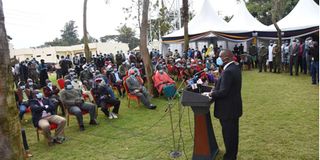Landmark ruling beams ray of hope on SGBV survivors in pursuit of justice

DCI Director George Kinoti addressing 2007/08 post election violence victims who had gone to record statements at the Directorate of Criminal Investigations offices on Kiambu Road in Nairobi on November 23, 2020. Photo | Evans Habil
What you need to know:
- The ruling was made on December 10, 2020 during the International Human Rights Day.
- The High Court found a "violation of the Kenyan State to investigate and prosecute violations of the rights to life, the prevention of torture, and the security of person."
- The judgment marks the first time ever in Kenya that post-election sexual violence survivors have been offered compensation for harm suffered.
A recent landmark ruling in favour of four Sexual and Gender Based Violence (SGBV) survivors of the 2007/08 post-election chaos has given hope to thousands of survivors in the country yet to get justice.
The ruling was made on December 10, 2020 during the International Human Rights Day.
In Constitutional Petition No.122 of 2013, the court found that the Kenyan government was responsible for "failing to conduct independent and effective investigations and prosecutions of SGBV related crimes during the post-election violence."
Four of the eight survivor were each awarded compensation of Sh4 million "for the violation of their constitutional rights."
Right direction
Eight survivors (six women and two men) joined with the international NGO Physicians for Human Rights and three civil society organisations (Coalition on Violence Against Women (COVAW); International Commission of Jurists-Kenya; and Independent Medico-Legal Unit in the lawsuit against six State actors.
The survivors detailed a range of harrowing accounts from the 2007/08 post-election violence: incidents of individual and gang rape, forced circumcision and other forms of sexual violence, which resulted in severe physical injuries, psychological and socio-economic suffering, and other serious health complications.
The High Court found a "violation of the Kenyan State to investigate and prosecute violations of the rights to life, the prevention of torture, inhuman and degrading treatment, and the security of person."
The judgment marks the first time ever in Kenya that post-election sexual violence has been legitimately recognised by the government and survivors have been offered compensation for harm suffered.
Some of the SGBV survivors are happy with the judgment which they view as a step in the right direction in ensuring justice for sexual violence victims.
“The government must fulfil its basic legal and human rights duties to acknowledge the harm that we have suffered, ensure accountability and give us reparations,” said one PEV survivor.
Tremendous improvement
Last month, the Office of Director of Public Prosecutions (ODPP) released the report which shows convictions of perpetrators of sexual violence related cases is increasing in the country.
In the report which was handed to President Uhuru Kenyatta at State House Nairobi, by Director of Public Prosecutions Noordin Haji shows a conviction rate of 78.5 per cent was attained, a 9.8 per cent increase from an average of 69 per cent conviction rate in the years 2017/18 and 2018/19.
In the past, there has been outcry from survivors of SGBV over slow conviction rate for the sexual violence perpetrators.
Mr Haji, while handing over the report, said the ODPP has recorded tremendous improvement by recruiting and training new youthful and energetic staff who have taken their roles with great commitment.
He said his office had set up a prosecution training institute to help it build internal institutional capacity to prosecute all manner of cases saying the focus of the agency was to enhance service delivery through automation of processes.
“In order to provide prosecutors with skills and knowledge to effectively and efficiently prosecute emerging and complex crimes, we have established the Prosecution Training Institute (PTI) and set up an e-library that will be the first of its kind in the East and Central African region,” said Mr Haji.
Bill pending
The Sexual Offences Act is also lined up for amendment through the Sexual Offences (Amendment) Bill, 2020 aimed at making the law more punitive against sex pests.
The Bill contains stringent measures aimed at helping address SGBV that continues to claim lives and impart pain to women and girls.
Among the key amendments is a particular clause that requires all employers to confirm whether a person seeking employment to a position of care or access to children or any vulnerable person has previously been charged or convicted of a sexual offence.
The Bill also says the State shall bear all costs incurred for the examination of a victim of sexual assault for the purpose of gathering evidence, including expenses related to preparing a sexual assault examination kit; and conducting tests for sexually transmitted diseases and pregnancy on the victim.
Kiambu Woman Representative Gathoni Wamuchomba, who has sponsored the Bill, in a recent interview told Nation that she is aware the Bill will generate a lot of heat but added she will stand firm.
“I will not be derailed and I will keep soldering on. I call on both my male and female colleagues to support the bills when it comes up for debate in parliament,” said Ms Wamuchomba.





